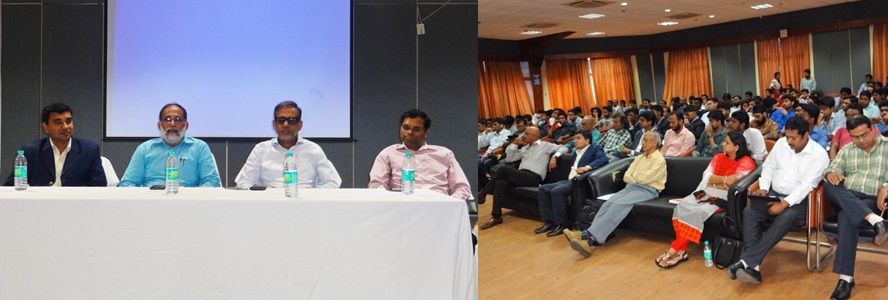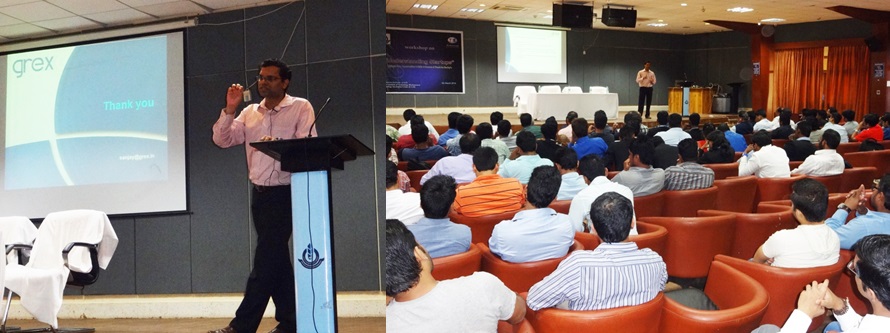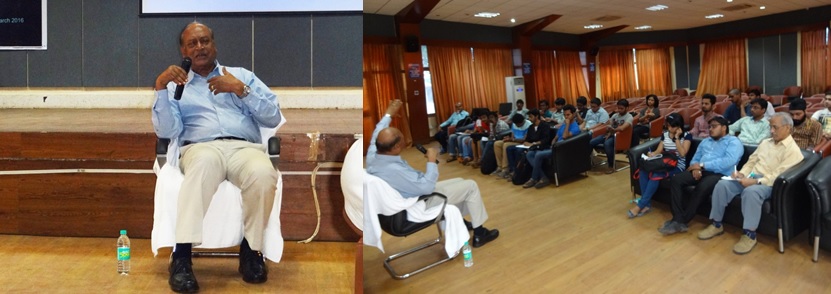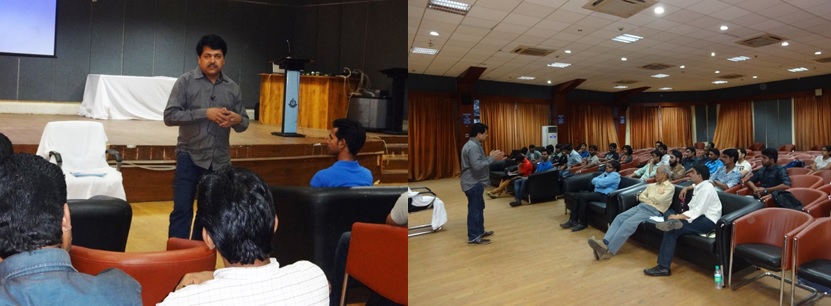Notice and Upcoming Events
Activities @ Startup Centre
Workshop on business plan, opportunities and risks, and sources of funding
E-Cell of the Institute conducted the Workshop on Business Plan, Opportunities and Risks, and Sources of Funding in collaboration with TiE Bhubaneswar on 5 March 2016. It was attended by students of IIT Bhubaneswar, students of other engineering colleges, and representatives from start-ups. The inauguration session was presided by Professor V. R. Pedireddi, Dean (CE) of the Institute. The other speakers were Professor A. Barve, Professor In-Charge of E-Cell and Mr. B. Sahoo, President of TiE.

The Workshop was organized in three sessions: one each on Business Plan, Opportunities and Risks, and Sources of Funds. There were three speakers.
The first speaker was Mr. Sanjay Kumar Nishank, an Electrical Engineering graduate from UCE, Burla, an MBA from IIM Bangalore, an angel investor, and a cofounder of GREX, an exchange-like private placement platform where he has been mentoring establishment and growth of start-ups. Mr. Nishank spoke at length about the elements of a Business Plan and the Do’s and Don’ts of the Business Planning Process. He particularly stressed on the need to make a thorough competitor analysis and a comparison with the other similar companies, mention the differentiating factors of the company, explicitly mention about the underlying assumptions, create barriers to entry for big players, and to recognize legal and licensing requirements and approvals. He also mentioned that most investors read only the first two paragraphs of a Business Plan, look for the size of the market, the growth features of the market, and for the exit option. He emphasized that the contents of a Business Plan should depend on the specific investor group before which it is presented.

During his talk, Mr. Nishank also highlighted the various funding avenues for start-ups and their advantages and disadvantages. He also spoke about the myths surrounding the funding avenues for start-ups, some of the myths being: Shall find a VC partner, revenues will be high, six months cash buffer is enough to meet the cash flow requirements, family money will be available, can build the team later.
The second speaker was Mr. Jagatananda Mahapatra, a Mechanical Engineering graduate from UCE, Burla and currently the CMD of Industrial Gases Private Limited, Bhubaneswar. In a highly motivating and interactive talk, Mr. Mahapatra shared his experience with the audience. He outlined the steps required to start an enterprise and recalled the challenges he faced while starting his own enterprise. In choosing the product, Oxygen, he had estimated its requirements in the state of Odisha, the only competitor then being the multinational British Oxygen. He mentioned how with a meagre personal saving of Rs. 40,000, he ventured to refurbish old machines of Odisha Government at Barbil and started his own company.
He stressed on the need to look for import substitution while selecting the product. He mentioned about the mandatory requirements of forming a Board of Directors, holding its meetings, opening Bank Accounts, and registering for Sales Tax, Excise Duty, and Explosives licenses, etc.

He cautioned against relying on only one large customer since it can create a lot of difficulty in delaying payments or even placing fresh orders. He mentioned how he picked up highly skilled technicians from the road-side garages and workshops, rather than recruiting the freshly certified individuals. He stated how he never took loan and used the meagre profits to become self-sufficient and how the hospitals in the state depend so acutely on his company for supply of oxygen. To a question how he ensures loyalty of employees, his opinion was “If you are loyal to your employees, they will be loyal to you.”
To a question on diversification, he narrated his own experience on how he went on to select interlocking bricks that he came across in Thailand, how he bought a second-hand machine and made a similar one in his workshop and started manufacturing interlocking brick manufacturing machines in his company. The orders for these machines come from within and outside the country.
He emphasized the freedom he enjoys, the lifestyle he is able to lead, the social contribution he has made, and the satisfaction he has derived from his endeavour of the past 35 years.
At the end, he invited the students to come to his plant and have a look at the factory. He also offered his assistance to mentor new start-ups. His final message was: “Be a small employer rather than an employee of a big organization.”
The third speaker in the Workshop was Dr. S. S. Acharya, Deputy General Manager of SIDBI, Bhubaneswar. He spoke on Sources of Funds. Sources of funds, he identified, are many: Personal savings, Family and Friends, Bootstrapping, Crowdfunding, Seed funds by government departments, Grants available through DBT and Ministry of MSME, Angel investors, Venture capital firms, and Banks. He gave details of these sources of funds and spoke on their merits and demerits. He described the Pradhan Mantry Mudra Yojana, the Credit Guarantee Trust for MSME (where no collateral is available), and the Mudra Guarantee Scheme (for providing security to trading companies), and the Micro-Finance institutions (such as Bandhan Bank) for non-farm sector low-fund loans. He brought out the importance of debt-equity ratio by saying that one has to have some equity before applying for debt.


